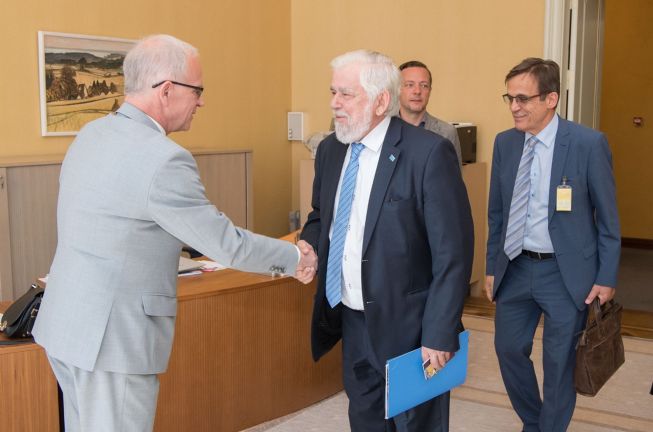European Economic
and Social Committee
President Dassis on an official visit to Estonia
The President of the European Economic and Social Committee, Georges Dassis, began his official visit to Estonia on 15 June by meeting with Minister for Education and Research, Mailis Reps.
The two discussed the challenges and recent successes of the education system in Estonia. The Estonian Presidency of the Council of the EU will place the education field as high priority, taking forward the initiative of the New Skills Agenda for Europe and notably its packages on investing in Europe’s youth and on modernising schools and higher education.
The discussion also focused on the creation of a common European history education, using the same textbook translated into all EU languages.

Next, the EESC President met with the President of the Estonian Parliament (Riigikogu), Eiki Nestor. The meeting tackled many common points of interest and focused on the extent of involvement of civil society into the lawmaking process in Estonia.
The two presidents discussed the widespread use of e-governance in Estonia as a possible good practice for the EU. Estonia is the leading country in Europe for digitalization, digital taxation and e-identification. Mr Dassis noted favourable the new regulations that are in place in Estonia, which include the obligation to consult civil society.
The two discussed innovation in the labour market. Mr Dassis emphasized that the main task of today’s working generation is to do everything to work together and ensure that Europe remains united. "The European economy can only grow if our work is innovative, smarter and more complex, and not just a race to compete with each other’s markets, paying workers lower wages,” said Mr Nestor. “Instead, the future of Europe is that we do work smarter."
Mr Nestor stated that the social partners' participation in addressing topical issues for the Estonian society is greater than that in many other European countries. The involvement of trade unions and employers at the parliamentary level has recently resulted in the Unemployment Insurance Act.


Following the EESC’s strategy to meet with civil society representatives working on the ground, Mr Dassis then met with Peep Peterson, President of the Estonian of Trade Union Confederation. Taking into account country-specific challenges, Mr Dassis said, social policy needs to be tackled at the EU level but adapted to each Member State’s reality.
The two agreed that social policy is vital in order to support the economy, with programmes such as lifelong learning, to improve living conditions and salaries. Estonian trade unions’ aim is to increase salaries by 6 percent over the next 20 years in order to catch up with the more affluent EU counterparts.
Mr Dassis then met with Rait Kuuse, Deputy Secretary General on Social Policy in the Ministry of Social Affairs. “It is crucial that we give support to all businesses which create jobs – the large and the small”, Mr Dassis declared. “Without a good social policy there is no future for a country. And the voice of civil society needs to be heard by the institutions.”
Mr Kuuse noted that the EESC has already received requests for two opinions on topics that are of high importance for the Ministry of Social Affairs in the framework of the Estonian Presidency. He also invited President Dassis to the conference “The future of work: making it e-easy” in Tallinn on 13-14 September.
The Deputy Secretary General spoke about their ongoing efforts concerning e-governance and accessibility, notably finding a common vision in the EU on the inclusion of disabled citizens.
Mr Kuuse stated that the Estonian Presidency will focus on work which is well paid and motivating, ensures economic prosperity, social coping and development, supports the well-being of children and families, promotes mutual care, equal opportunities and gender equality, and ultimately ensures long and high-quality life for citizens.
